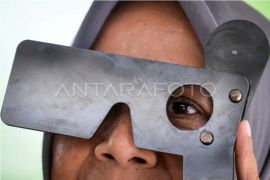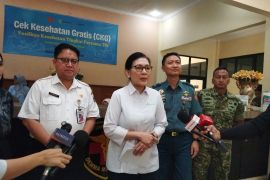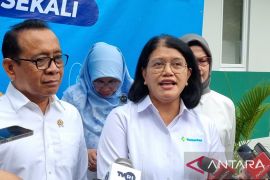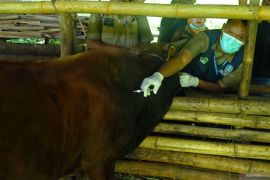"Wolbachia is a symbiotic bacterium that can be found in more than 70 percent of global insect species, including flies, bees, butterflies, and mosquitoes," stated Imran Pambudi, Director of Infectious Diseases Prevention and Control at the ministry, on Thursday.
He explained that introducing Wolbachia bacteria into Aedes aegypti mosquitoes aims to reduce their ability to transmit the dengue virus among humans.
The technology is designed to complement the existing dengue control program, such as the One House One Larva Monitoring Unit Initiative and Dengue Operational Unit, he highlighted.
Referring to the ministry's study, Pambudi said Aedes aegypti mosquitoes with Wolbachia possess the same genetic properties as their local counterparts.
Fortunately, the bacteria, considered good, safe, and natural, can be found in the human environment, Pambudi noted.
Such conditions allow for the opportunity to enhance dengue control by breeding Wolbachia mosquitoes with those carrying the dengue virus, so their offspring will no longer be able to spread the virus, he explained.
He drew attention to Ministry Decree Number 1341 of 2022, which stipulates that the ministry will host the Wolbachia pilot project in five cities: West Jakarta, Bandung, Semarang, Kupang, and Bontang.
"Two weeks ago, we launched the project in Semarang in Tembalang Sub-district, and then gradually, it will be emulated in other sub-districts," Pambudi revealed.
The technology has managed to suppress the dengue infection rate by 77.1 percent, which also decreased the hospitalization rate by 82.6 percent, he pointed out.
The World Health Organization supports this program as it has shown success, and they recommended Wolbachia as an innovative method in dengue control in 2020, he noted.
He elaborated that the effectiveness is also supported by data from a risk analysis conducted by the Ministry of Research and Technology and the Ministry of Health during the period from 2011 to 2016.
The analysis stated that the risk from the use of Wolbachia technology in the next three decades can be overlooked.
Currently, the technology is adopted in some countries. A factory in Brazil is perfecting the process and improving its efficiency to breed and release Wolbachia mosquitoes, with the objective of conducting a larger-scale expansion that is bigger than Indonesia, he stated.
"There was a concern about mutation, but prior to the deployment of Wolbachia, we have been very careful. We have conducted research with experts since 2011 and in 2016 or 2017, after more research, we then launched in areas other than Yogyakarta," Pambudi remarked.
He said that the government does not yet have the capability to emulate the technology in those five cities simultaneously, as it requires preparations, such as information dissemination, appealing to people not to conduct fogging that could deter Wolbachia mosquitoes.
He also highlighted the need for a better extent of innovative measures to be applied to produce more Wolbachia mosquito eggs since their numbers are still limited.
"Hence, we can conclude that Wolbachia is a sustainable and eco-friendly technology," Pambudi said.
Related news: ASEAN Dengue Day proof Indonesia serious about tackling disease
Related news: Beware of El Nino impact that spikes dengue cases: Ministry
Translator: Hreeloita Dharma S, Mecca Yumna
Editor: Anton Santoso
Copyright © ANTARA 2023












